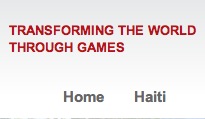 A different kind of systemic change project? Many people have heard of the games FarmVille, Mafia Wars, and Zynga Poker. What many people, gamers and nongamers, might not know is that Zynga gamers have raised nearly $3 million for Haiti since October 2009.
A different kind of systemic change project? Many people have heard of the games FarmVille, Mafia Wars, and Zynga Poker. What many people, gamers and nongamers, might not know is that Zynga gamers have raised nearly $3 million for Haiti since October 2009.
But as the graphic shows the folks at Zynga are using the funds to try to break the cycle of poverty in Haiti.

They are currently focusing their efforts on families and children in the Plateau Central Départment, which was significantly impacted by tens of thousands of refugees who survived the devastating earthquake in January 2010. Contributions from their players have been critical in building a kitchen to provide hot lunches to 200 school children, and in supporting children to attend school.
Zynga – Zafen! (Sounds linke a chant!)
Zynga is among the sponsors of Zafèn
There is even a Zynga team that has raised $350,000!
In another post I hope to explore what will call strategy games the provide vicarious experiences of various aspect of poverty such as Hobson’s Choice or Ayiti, a game developed in 2005 to bring home the complexity of survival in Haiti (pre- earthquake.)
Reflections:
- Have you ever thought of games the way the people at Zynga think…”We believe social gamers can make a powerful and positive impact when provided with opportunity.”
- If you are a Zynga gamer (think Farmville or other game) were you aware you could help Haiti?
- What other infinitely creative ways are there of approaching systemic change?
Join the conversation below…
Tags: Change, Haiti, Systemic change

An update on the use of games for social change
http://www.prsa.org/Intelligence/Tactics/Articles/view/9053/1027/Play_on_player_A_look_inside_the_social_gaming_phe
Middle of the article:
A quest for social good
Games can draw attention to causes, and it is also possible to help the world when you play some of them, Schell says. One example is Foldit, a multiplayer game where users can contribute to science by helping solve puzzles.
Games like the Points for Pakistan program asks players to donate to a cause at the end, while others promote sustainability in real life by tracking carbon footprints or informing people about social issues.
Also, Zynga has sold branded virtual goods in its games on behalf of the victims of the Haitian earthquake (Sweet Seeds for Haiti) and the Gulf Oil Spill. Players have also purchased social goods within games to benefit school lunch programs for children in Haiti. Zynga players have raised more than $6 million for several international nonprofits since Zynga.org launched in October 2009.
“When we are in game worlds, I believe that many of us become the best version of ourselves,” McGonigal said. “The most likely to help at a moment’s notice — the most likely to stick with a problem as long as it takes, to get up after failure and try again. In real life, when we face failure, when we confront obstacles, we often don’t feel that way.”
This past year, Fleishman-Hillard created its own multimedia communications campaign, “AdMongo — Live the Adventure,” for the Federal Trade Commission to help children build advertising literacy skills.